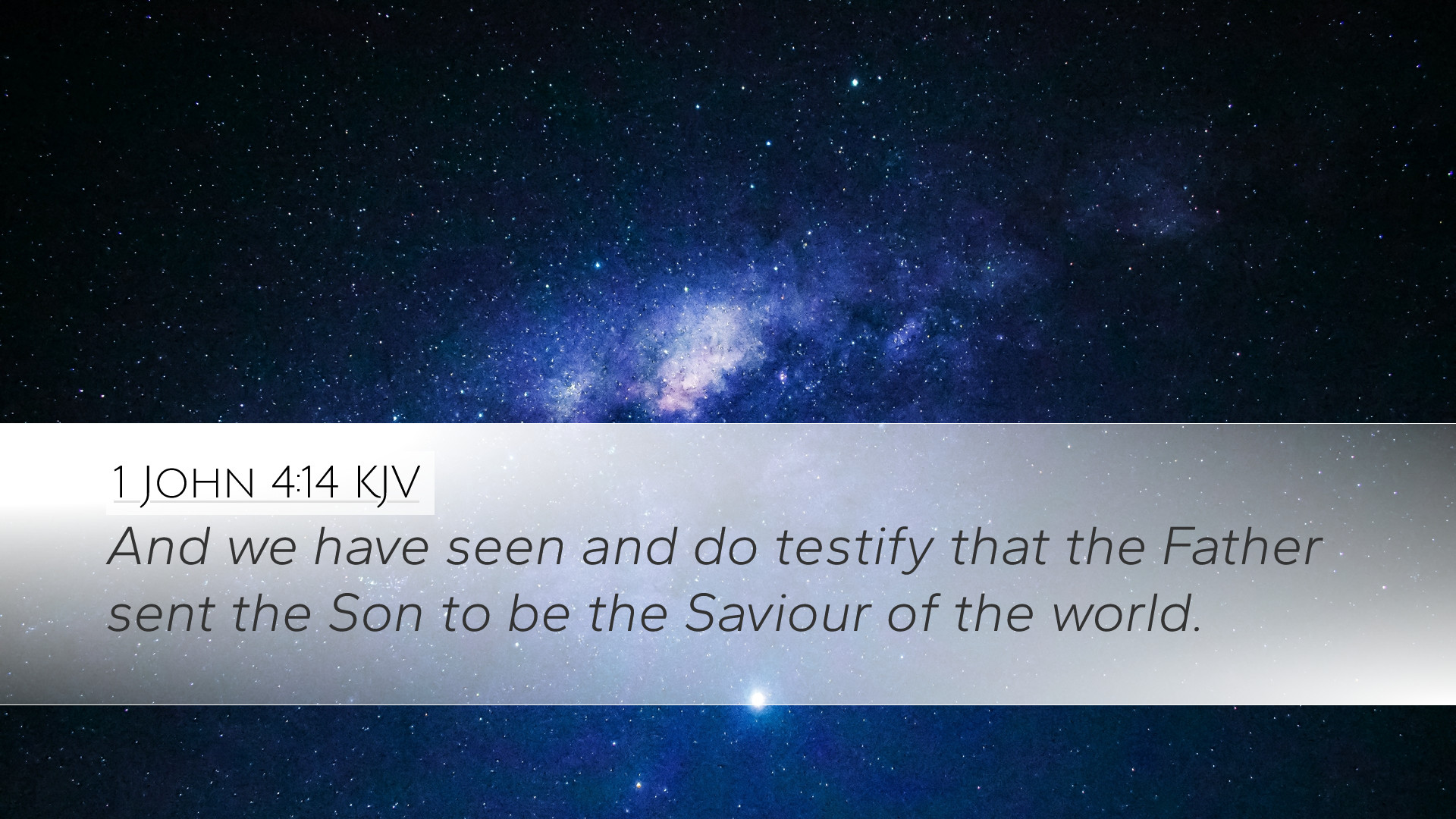Old Testament
Genesis Exodus Leviticus Numbers Deuteronomy Joshua Judges Ruth 1 Samuel 2 Samuel 1 Kings 2 Kings 1 Chronicles 2 Chronicles Ezra Nehemiah Esther Job Psalms Proverbs Ecclesiastes Song of Solomon Isaiah Jeremiah Lamentations Ezekiel Daniel Hosea Joel Amos Obadiah Jonah Micah Nahum Habakkuk Zephaniah Haggai Zechariah Malachi1 John 4:14
1 John 4:14 KJV
And we have seen and do testify that the Father sent the Son to be the Saviour of the world.
1 John 4:14 Bible Commentary
Commentary on 1 John 4:14
Verse: "And we have seen and do testify that the Father sent the Son to be the Savior of the world." (1 John 4:14, KJV)
Introduction
This particular verse holds profound theological significance, encapsulating the essence of the Christian faith regarding the nature of Jesus Christ and His salvific mission. It serves as a bridge connecting the apostolic witness of Christ's life and ministry to the necessity of belief in Him for salvation.
Theological Themes
- Apostolic Testimony: The phrase "we have seen and do testify" underscores the authoritative witness of the apostles. Matthew Henry emphasizes that their eyewitness experience is crucial for the credibility of the Gospel message.
- The Father's Mission: Albert Barnes elaborates on the theological implications of the Father's role in sending the Son. This emphasizes God's initiative in the plan of salvation, portraying His desire for humanity's redemption.
- Universal Salvation: The term "Savior of the world" indicates the inclusive nature of Christ's atoning sacrifice. Adam Clarke highlights that this isn't limited to a particular group but extends to all humanity, signifying the universal call to repentance and faith.
Exegesis of Key Phrases
“And we have seen”: This phrase signifies a firsthand experience, vital for authentic testimony. The apostles not only heard about Jesus; they walked with Him, witnessed His miracles, and observed His resurrection. This direct knowledge led to a profound conviction and urgency in their preaching.
“Do testify”: The act of testimony is formational for the Christian faith. It is not merely speaking about beliefs but conveying a life-transforming encounter with Christ. Henry points out that genuine faith prompts believers to share their experiences of grace with others.
“The Father sent the Son”: This statement reflects the divine mission and cooperation within the Trinity. Barnes notes that it highlights both the authority of the Son and the love of the Father, establishing a foundational principle for understanding Christian salvation as originating from God.
“To be the Savior of the world”: This phrase carries immense weight, indicating that Jesus is not just a moral teacher but the divine Savior. Clarke stresses this title's significance, asserting that Jesus's purpose was to save humanity from sin, signifying that all who accept Him find real hope and redemption.
Historical Context
Understanding the historical context of John's writing enhances our comprehension of this verse. The early church faced challenges from various heretical teachings undermining the nature of Christ. In this letter, John seeks to reaffirm orthodox beliefs, reminding the followers of their foundational truths about Jesus as the Son of God who came to save.
Practical Implications for Believers
- Assurance of Salvation: The verse provides certainty regarding the nature of salvation through Christ, offering comfort to believers who may wrestle with doubts about their standing with God.
- Witnessing and Evangelism: The call to testify underscores the responsibility believers carry. Their experiences with Christ empower them to share the Gospel with others effectively. Henry encourages believers to be bold in their testimony and to seek opportunities to declare the marvelous works of God.
- Understanding God's Love: This verse encapsulates the depth of God's love for the world in sending His Son. It cultivates gratitude and motivates believers to embody that love toward others in their communities.
Conclusion
1 John 4:14 serves as a powerful reminder of God's redemptive plan through Jesus Christ. It incorporates essential aspects of Christian theology, apostolic witness, and practical Christian living. For pastors, students, theologians, and Bible scholars, the richness of this verse invites deep reflection and encourages the active sharing of the Gospel, ensuring that the world hears of the Savior sent for all mankind.


